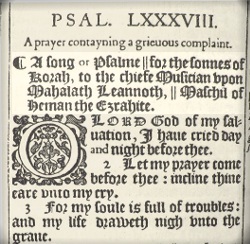On Reading Tyndale's 1536 New Testament
 Reprinted with permission from As I See It. AISI is sent free to all who request it by writing to the editor at [email protected]. Photo: GREATSITE.COM, which also has a review.
Reprinted with permission from As I See It. AISI is sent free to all who request it by writing to the editor at [email protected]. Photo: GREATSITE.COM, which also has a review.
Nearly a decade ago, I “chanced” upon a hardback facsimile reprint of the 1536 edition of William Tyndale’s New Testament translation (Columbus, Ohio: Lazarus Ministry Press, 1999. The original is #21 in the chronological listing of printed editions of the Bible in English in A. S. Herbert’s Historical Catalogue of Printed Editions of the English Bible 1525-1961, p. 13). The price was acceptable (just under $32), so I purchased the volume and have consulted it from time to time. I very much prefer facsimile reprints over mere reproductions (in print or on the net) of the text of a Bible translation, because there are regularly features of the original edition that are omitted in the reprint, along with the very real possibility of inadvertent alterations in the text.
At the beginning of this year, I decided to read this facsimile NT through, and just this morning (as I write), completed the task (which had been interrupted by two trips to Eastern Europe). This makes at least the 8th different English translation of the NT that I have read entirely. These—in roughly I read them—include KJV, ASV, NASB, NIV, Stern’s Jewish NT, ERV, HCSB and now Tyndale (of course, I have read several of these repeatedly and have read portions of the NT in many other English versions).

 Reposted with permission from
Reposted with permission from  Jonah: a paradox
Jonah: a paradox Read
Read
Discussion